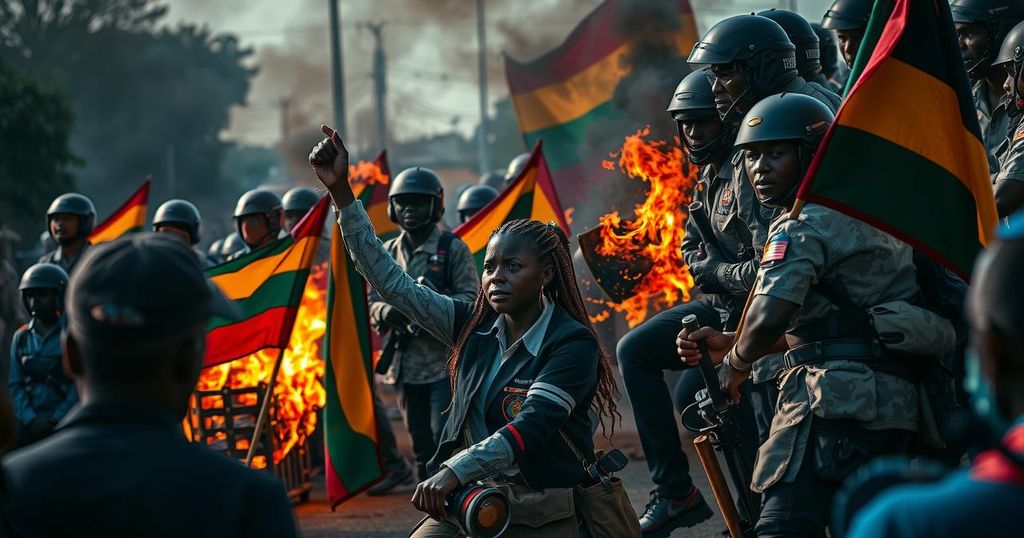The political landscape in Uganda and Zimbabwe is troubled by government crackdowns on dissent. The Anti-Homosexuality Act in Uganda imposes severe penalties, causing international outcry. Zimbabwe experiences similar repression, marked by the detainment of opposition leaders. With elections approaching, both nations indicate a troubling trajectory for democracy and human rights, necessitating urgent responses from the international community.
The political landscape in Uganda and Zimbabwe is increasingly precarious, characterized by intensified government suppression of dissent and opposition voices. The implementation of the Anti-Homosexuality Act in Uganda has prompted widespread condemnation due to its extreme penal measures and its potential to undermine civil liberties. Similarly, Zimbabwe faces systematic oppression under President Emmerson Mnangagwa, highlighted by the recent detainment and subsequent release of opposition activists. Both nations are approaching elections under a cloud of authoritarianism, raising concerns about the viability of democracy and human rights in the region.
In Uganda, the passing of the Anti-Homosexuality Act has triggered severe reprisals against the LGBTQ+ community and those advocating for human rights. The law’s vague stipulations classify a range of homosexual activities as “aggravated homosexuality,” punishable by the death penalty and life sentences for those implicated. This draconian legislation has drawn mixed reactions globally, with significant institutions like the World Bank halting funding, while advocacy efforts from the United States seek to address human rights abuses through targeted sanctions. Nevertheless, the European Union’s response has been criticized for lack of decisive action, focusing primarily on expressing regret rather than taking tangible steps.
Furthermore, the Ugandan government has ramped up efforts to stifle political opposition as elections loom. Reports of political abductions, such as the case involving the veteran opposition leader Kiiza Besigye, exemplify the lengths to which the ruling party will go to maintain its grip on power. Besigye’s abduction, followed by charges of weapons offenses upon his return, signals alarming trends of authoritarianism under President Yoweri Museveni.
In Zimbabwe, the current regime’s oppressive tactics mirror those used by former President Robert Mugabe, as exemplified by the recent release of opposition leaders who had been detained under charges of unlawful assembly. Despite being sentenced to suspended sentences, these activists were initially detained for participating in what was reportedly a benign social gathering, underscoring the regime’s misuse of the judiciary to silence dissent. Amnesty International’s assessment identifies these actions as part of a broader pattern of repression initiated by the current administration, perpetuating a legacy of political intimidation.
The dynamics of regional diplomacy further complicate the situation. The abduction of opposition leader Kizza Besigye has raised serious questions regarding Kenya’s diplomatic role, especially given its close ties with Uganda. The apparent inaction from Kenyan authorities may indicate a troubling level of complicity, jeopardizing diplomatic relations between the two nations. Additionally, Russia’s growing influence in Uganda, through the promotion of anti-LGBT initiatives, adds another layer of complexity to the political maneuverings within the region.
As both countries strive toward elections, the entrenched authoritarian practices cast deep shadows over the prospects for democratic governance. Activists and ordinary citizens alike face escalating pressures in exercising their rights, raising critical concerns about the future state of democracy. The urgent need for international and regional bodies to respond with effective measures against these oppressive regimes becomes increasingly clear, with significant implications for civil liberties in Uganda and Zimbabwe.
Notably, the need for a reevaluation of international partnerships is paramount, as economic considerations appear to overshadow human rights commitments in negotiations with these rights-abusing governments. The advocacy for justice and accountability continues to resonate among citizens, highlighting the imperative for tangible reform and adherence to democratic principles in both Uganda and Zimbabwe.
Uganda and Zimbabwe are experiencing a considerable rise in government repression against opposition figures and human rights advocates, coinciding with crucial election periods in both countries. The Ugandan government’s enactment of the Anti-Homosexuality Act has drawn international condemnation due to its severe penalties and potential misuse against marginalized communities. In Zimbabwe, an ongoing pattern of detaining and prosecuting opposition activists highlights the political climate that stifles dissent, reflective of the oppressive tactics employed by successive governments. These developments raise significant calls for compliance with international human rights standards.
In conclusion, the prevailing political climates in Uganda and Zimbabwe exemplify a systemic erosion of democratic norms and civil liberties, as both nations approach significant electoral phases amidst heightened oppression. Global responses to this situation reveal the complexities of international diplomacy, with calls for accountability and justice resonating from local citizens and activists. For meaningful change to occur, a concerted effort from regional and international bodies is imperative to safeguard the principles of democracy and human rights in both countries.
Original Source: evrimagaci.org







